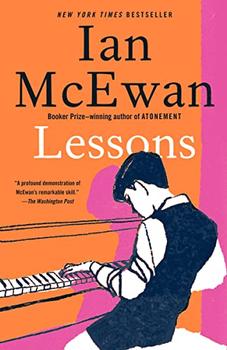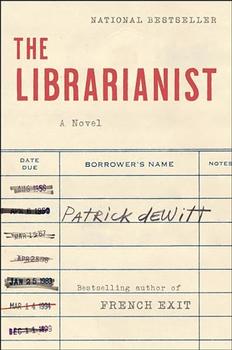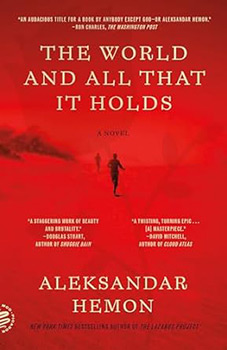Summary | Excerpt | Reading Guide | Reviews | Beyond the book | Read-Alikes | Genres & Themes | Author Bio

A novel
by Ian McEwanIn Ian McEwan's Lessons, Roland Baines succeeds a father and a grandfather who each fought in a World War and is preoccupied with whether he can make enough of a difference in the relatively peaceful milieu he has been dealt. As we follow him coming of age, then coming of old age, from his early student days in British-administrated Tripoli to smuggling forbidden rock records to friends in East Berlin to sitting comfortably numb in an armchair in suburban Clapham during the lockdown, we observe his confrontations with his own mediocrity as an artist and as a force for political good. A classical piano prodigy growing up, he winds up playing "munch music" in a tearoom, and what's sneaking entertainments past Checkpoint Charlie compared to his father-in-law's participation in the White Rose (see Beyond the Book) Nazi-resistance movement?
But mediocrity shouldn't preclude happiness, right? His personal life is messy, doubly shadowed by the predatory piano instructor who abused him in his youth, whose near-demonic grip on his psyche skews his whole career trajectory, and by the wife who leaves him and their child because she can't bear to make her mother's mistake of settling down before achieving her potential outside of parenthood. Still, there remains the son he loves dearly, the intimate friendships that offer him guidance and understanding, and his dedication to pushing forward social justice in whatever capacity he can.
Lessons is the 17th novel by Ian McEwan, who seems to have down pat the art of literary page-turners that weave the personal through the historical and vice versa. This latest bears an epigraph from Finnegans Wake: "First we feel, then we fall." Joyce, and now McEwan by extension, means for you to mix up those two loaded F-words like they're tenses of the same word. Lessons mumbles its take on the feel/fall duality of life, never settling on a separation between love and decay, desire and doom, worldly ambition and personal responsibility, moral correctness and forgiveness, optimism and blunt fact.
Most of the novel's characters are real enough and smart enough to raise questions about the tendencies the close reader wants to pin on them. For example, it's easy to point out that Roland Baines has a guilt complex, and that this stems from being manipulated as a child into thinking he deserved to be punished; in this case, his supposed wrongdoing was a lie he was told. The trouble (and the psychological fascination) with this observation is that Roland, like anyone else, also regrets actions and inactions of which he wasn't so innocent. In moments of conflict, there's still the boy in him who thinks he doesn't deserve to stand up for himself, alongside the man who can judge freely whether fight or surrender is the appropriate course to take.
Lessons shines at disrupting hoary old concepts like good guys and bad guys, clear motivations and closure by tweaking well-trodden themes. Roland realizes that the ex-wife who abandoned him and their son to nurture a career as a novelist isn't any more callous than male artists he respects who similarly dropped their familial burdens. The only differences are her gender and his close personal involvement. In fact, the novels that result from the rupture of his marriage turn out to be such gems that Roland comes to the conclusion that maybe it was all for the best. This doesn't come as a late breakthrough, but as a possibility he's been turning around in his head for years. The contempt the reader is likely to feel for the piano teacher who seduced/ensnared him as an adolescent is less subject to revision over time. But the way she repeatedly surfaces and subsides in Roland's consciousness, as both fantasy and PTSD specter, makes for a refreshingly complicated and undramatic depiction of long-term trauma.
Perhaps inevitably, the plot's artful setup, with all its neat foreshadowing and synchronicities guaranteeing a juicy outcome, its trotting out of historical upheavals through yet another fictional character's lens, can feel a tad by-the-numbers. Sometimes you can almost glimpse the novelist consulting his outline and research to make sure no poetic connection goes unconnected. But for the book's spectacular chemical reactions to occur, some basic elements have to be methodically poured into the mix.
While Lessons puts plot, characters and ideas first, its prose style is routinely insightful and enticing: "Long drives usually settled him into sustained reflection… His little car, nimbler and more spacious than he expected, was a thought-bubble pushing north through a country he no longer quite knew or understood."
McEwan updates us on Roland's journey right up to 2021, when the ordinary hero is precisely as uncertain of what the world will look like in upcoming years as we are. When your book's ending hinges on the meaning of actual life at this moment in time, it's a strong statement that the story isn't meant to be any kind of summation. It's fortifying to witness a sympathetic person deal, or fail to deal, with all the ups and downs that only death levels out; to see how defining moments that are supposed to be impactful come off as banal; how epiphanies can leave a bad taste in the mouth after a few minutes of reality checking; and how, looking back, reversals in fortune do, time permitting, reverse again.
Lessons approaches the oblique, animated, jazz-like tenor of life through literature's artificial techniques. It is a handily crafted and realistically followed through tale of characters' scramble for purpose and perspective in the variegated post-Second World War epoch.
![]() This review was originally published in The BookBrowse Review in November 2022, and has been updated for the
September 2023 edition.
Click here to go to this issue.
This review was originally published in The BookBrowse Review in November 2022, and has been updated for the
September 2023 edition.
Click here to go to this issue.

If you liked Lessons, try these:

by Patrick deWitt
Published 2024
From bestselling and award-winning author Patrick deWitt comes the story of Bob Comet, a man who has lived his life through and for literature, unaware that his own experience is a poignant and affecting narrative in itself.

The World and All That It Holds
by Aleksandar Hemon
Published 2024
The World and All That It Holds―in all its hilarious, heartbreaking, erotic, philosophical glory―showcases Aleksandar Hemon's celebrated talent at its pinnacle. It is a grand, tender, sweeping story that spans decades and continents. It cements Hemon as one of the boldest voices in fiction.
Your guide toexceptional books
BookBrowse seeks out and recommends the best in contemporary fiction and nonfiction—books that not only engage and entertain but also deepen our understanding of ourselves and the world around us.